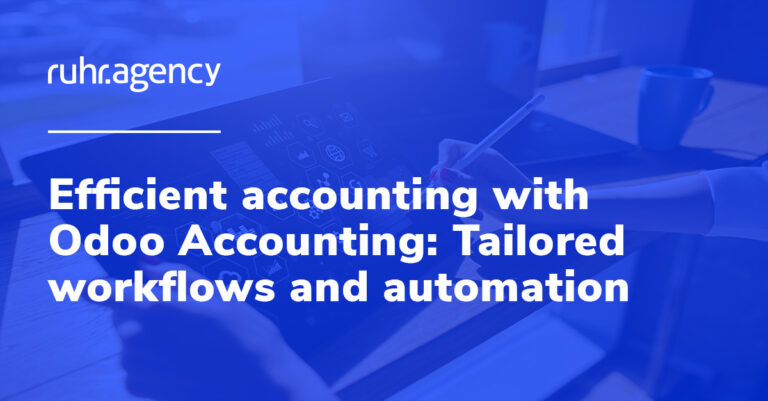Alexander Zehnter, financial expert and former commercial director at Severin Touristik, has developed into one of Germany’s Odoo experts in recent years. His knowledge of Lean ERP with Odoo is now in high demand. We at ruhr.agency also asked Alexander Zehnter questions. In a detailed interview, he told us what he considers to be the greatest advantages of Odoo, what you should bear in mind when implementing Odoo and which features he is most looking forward to in the new version.
Hi Alexander, great you found some time. Let’s start with a simple question: What exactly makes Odoo so attractive and exciting for you?
Alexander Zehnter: On the one hand, it’s easy to familiarize yourself with Odoo. From a business perspective, we asked ourselves why we didn’t just go for one of the big players like SAP or Microsoft. However, we were put off by the fact that they are very complex, very expensive and not open source. We wanted to have and keep a lot of knowledge in-house. Last but not least, the fact that we wanted a cloud-based solution was also a decisive factor.
Does that mean you picked up the knowledge about Odoo yourself?
Yes, we inevitably had to. Our company consisted of three companies, one was the tour operator based in Germany, two of them were based in Kenya and were hotels. Once we had decided on Odoo as our ERP, even against the resistance of some doubters, a local Odoo partner was to carry out the implementation. However, when the project scope was not met at all after two months, we decided to tackle the matter ourselves and take it into our own hands.
And how did you acquire the knowledge yourself?
We simply looked up tutorials and videos and got to work. Whereby it has to be said that you reach your limits at certain points because you lack best practices. For example, in terms of product categories or units of measures. At this point, we realized that we needed external support. The advantage of Odoo, however, is the large community and the many experts that exist. We then hired a freelancer and worked with him to implement the project. So it was a make or buy decision and we opted for make. Of course, we made pretty much all the mistakes you can make, but we also learned from them and that’s why I now share my knowledge so openly on LinkedIn, because there are people out there who are at the same point and need help.
Did you take on different roles during the implementation or what exactly was your role?
Initially, I was the commercial manager and therefore responsible for the finances. As the outdated software at our Kenyan hotels only ran locally and I was only on site four to five times a year, it was clear that the new software had to be cloud-based and, above all, had to include accounting. The original trigger, however, was the property management for the administration of the room contingents. Odoo does not have such a feature. We already had cloud software for this, and we had to find a way for Odoo to connect to this software. Other considerations were software for POS and warehouse management. If we had covered each of these use cases with our own software, we would have spent 20,000 Euros a month on licenses. That’s why we said that 80 percent of these cases, such as POS, inventory management, purchasing and accounting, can be covered by Odoo and we pay the same money for five years with Odoo. That has made all the difference.
How did you decide to use Odoo?
Because we didn’t want to use different software for each individual area. On the one hand, this is considerably more expensive and, on the other, there is a risk that the different solutions will not be able to communicate with each other. At Odoo, we have everything in a single, integrated solution.
How do you think Odoo could help you in the next five years, especially with regard to the new version 17?
The change in the license model means that any number of apps can now be used per user. Above all, I see the potential to introduce and use the HR app. Another major topic is marketing automation. What I can also imagine is an app for the maintenance and repair of the hotel facilities.
Would you say that Odoo is very flexible when it comes to adapting the applications to individual requirements?
Yes and no. (laughs) Basically, you can do everything in Odoo. Odoo is like a Swiss army knife. However, if you add a lot, it becomes more and more complex and upgrading to a new version becomes more and more difficult.
And from your own personal perspective – what pain does Odoo solve in your area in particular?
In the beginning, I thought that Odoo accounting was the coolest thing. But there are quick wins, such as the barcode for warehouse management. I’m sure this is already considered standard in Europe, but by Kenyan standards it was simply cool. Another quick win is Odoo Documents. Turning many physical documents into individual digital invoices at the touch of a button was a huge relief for the people on site.
What would you say are the advantages and disadvantages of cloud and on-premise?
With Odoo, you can basically choose whether you want to host the instance in the Odoo cloud or on-premise in your own cloud. In the beginning, we hosted the entire system via the Google Cloud, but I can’t recommend that. It requires a lot of computing capacity and is therefore expensive. Then we switched to Odoo.SH, which is simply tailored to Odoo and made it much easier and cheaper.
How do you see Odoo in terms of mobile devices?
We used the barcode app ourselves in conjunction with mobile devices and it worked really well. But basically we mainly used it on the PC.
In your opinion, which integrations are crucial for a switch to Lean ERP in the cloud?
As far as the Marketplace at Odoo is concerned, to be honest this is a minor bone of contention. There is a marketplace with over 30,000 apps, but there is also a lot of crap in there. Users who have high hopes for the Marketplace will quickly become disillusioned, as many apps are not compatible with the latest version or have bugs. The large and popular apps all work, but the majority of apps aren’t good.
What considerations should a company make when deciding to switch to Odoo and migrate its data?
Two considerations need to be made: If accounting data is affected, then the time of the migration must be taken into account in any case, for example with regard to the input tax declaration. As accounting always works with a time lag, it is also important to ensure that the data is up to date. This means that you always need an accounting closure before you want to migrate.
Secondly, it should also be noted that Odoo has its own fields for products or categories, for example. You have to be careful how you fill them. For example, we initially set up many products incorrectly and then had to archive them again.
What would you say are the three most important success factors in the introduction of Odoo?
First, top management must be absolutely convinced that an ERP is needed. Introducing an ERP is not easy and always involves a lot of sweat and tears, and not everything will work out as planned right from the start. Expectations must be managed accordingly. Second, do as little customizing as possible. Many people think that their industry and their product are so special that they need a special industry solution. But that is not the case. Many basic processes are always the same. Therefore, the consideration should be: Does Odoo have to adapt to me or does Odoo already have solutions or processes out of the box that are perhaps faster or better? So you should also see it as an opportunity to question your own processes.
The third important success factor is: start small. The good thing about Odoo is that it has a modular structure. So you should start with your biggest pain and then gradually cover other areas. For example, we only introduced warehouse management six months after accounting.
So firstly management buy-in, secondly no customizing and thirdly a modular approach.
Thanks, Alexander. It is very interesting to hear that customizing should not play a role from the customer’s point of view. From our Odoo partner’s point of view, individual customization naturally plays an important role.
I can understand that. If the customer is happy with the adjustments and everything is going well, it is of course fair and important. However, I can imagine that projects are often protracted as a result. It’s better to have something up and running quickly. This allows you to issue invoices or use the CRM. This ensures greater customer satisfaction. You can still make the individual adjustments.
How well would you say Odoo can scale and adapt to changing requirements without always having to go through a major build-up phase?
As I already mentioned, this modular structure of Odoo is something that makes it very scalable. You can start with the CRM and then gradually add purchasing, accounting and other things.
What do you think about data analysis and reporting in general? Do you think Odoo has sufficient capabilities to enable management to make data-driven decisions? If so, what can you recommend exactly?
What I like is Odoo’s accounting dashboard. It gives you a simple overview of account balances, incoming and outgoing invoices and how many invoices are still unpaid. As in other ERP systems, you can compile your own dashboards in Odoo, for example on the turnover generated, customer analysis or benchmarking options. It’s a long way to all these dashboards, but it’s great when you have them.
From a business perspective: What return on investment can companies expect from the implementation of Odoo?
Of course, you can’t make a blanket statement like that. It also depends on how well the implementation is going. In our case, the quick wins I mentioned, such as the barcode scanner, were a real ROI that enabled us to achieve efficiency gains of around 80 to 90 percent. For our German company, Odoo meant that we only needed half the number of employees in sales, who in turn generated a higher turnover. The entire sales process, from sales orders to invoicing, was much faster and more efficient. The entire order-to-cash process was probably 50 percent faster than before.
Have you noticed a difference in employee motivation since you introduced Odoo?
Yes, clearly. Of course, management has to set an example. With such a big change in day-to-day work, there tends to be a lot of resistance. It is crucial that employees quickly start working with the new software. When they then see that it is fairly simple and results in more sales with less effort, everyone is happy.
To what extent have you made use of Odoo’s support and community?
We didn’t use the Odoo support that much. I in particular used the community a lot. I can recommend them without restriction.
Which feature of the new version of Odoo are you most looking forward to or do you think is the most important?
What’s really cool, of course, is the new style of Odoo. The new PoS feature is important for hotels, as it will display incoming orders for the kitchen on a screen in future.
Alexander, thank you very much for taking the time to answer our questions.




